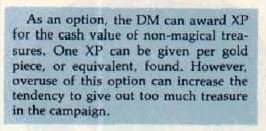Doing It Wrong
I've been re-reading the AD&D Second Edition Dungeon Master's Guide, as part of my continuing exploration of the concepts of experience and level. I thought it might be worthwhile to take a look at how the various TSR editions of the game handle these matters. In doing so, I was surprised to see this bit of highlighted text:
 As an option? What's going on here? Prior to looking at this section for the first time in untold years, I had assumed that, when it came to the awarding of experience points, 2e followed closely in the footsteps of its predecessor, with XP being given for the defeat of foes and the acquisition of treasure. That's certainly how I remember XP awards working in Second Edition. It's also how I remember playing the game back in the late '80s and early '90s. Was I playing the game wrong all those years ago?
As an option? What's going on here? Prior to looking at this section for the first time in untold years, I had assumed that, when it came to the awarding of experience points, 2e followed closely in the footsteps of its predecessor, with XP being given for the defeat of foes and the acquisition of treasure. That's certainly how I remember XP awards working in Second Edition. It's also how I remember playing the game back in the late '80s and early '90s. Was I playing the game wrong all those years ago?Yes, apparently. If you play AD&D 2e by the book, there are only two ways that characters earn experience points. The first are the group awards, earned for "victory over their foes." This type of award has existed in every edition of Dungeons & Dragons since 1974 and is based on the hit dice and special abilities of the enemies defeated. The second are individual awards, given out on the basis of a character's class. Thus, a fighter gets an individual award of 10 XP per hit die of a defeated enemy per level, while a magic-user gets one by using spells "to overcome foes or problems" at a rate of 50 XP per level of the spell cast, among other awards. This second type of award is new to Second Edition.
When you look at the individual class awards, you'll notice something interesting. A class award for thieves is 2 XP per gold piece value of treasure obtained. What used to be a default means of obtaining experience – a "group award" in Second Edition's parlance – is now exclusive to thieves (and other rogues) and at twice the previous rate. I can see the train of logic that led to this element of the new edition's design: if you're committed to the idea of individual class-based awards, it makes sense that thieves ought to be rewarded for, well, stealing. However, the rules develop this notion in a way that completely excludes other classes for benefiting, experience-wise, from the acquisition of treasure.
This is a huge shift away from the design of all prior editions of Dungeons & Dragons, which accepted the implicit pulp fantasy assumption that, to one degree or another, all characters are thieves, in the sense that they all benefit from treasure hunting, tomb robbing, and similar larcenous activities. Second Edition is a tacit repudiation of that conception of D&D, which I suppose only makes sense for a post-Dragonlance edition. The shift toward a more "heroic" presentation of the game was well under way by this point and perhaps this change is yet more evidence of it.
How I somehow managed not to take notice of it, though, is a genuine mystery.
Published on October 13, 2022 05:35
No comments have been added yet.
James Maliszewski's Blog
- James Maliszewski's profile
- 3 followers
James Maliszewski isn't a Goodreads Author
(yet),
but they
do have a blog,
so here are some recent posts imported from
their feed.



